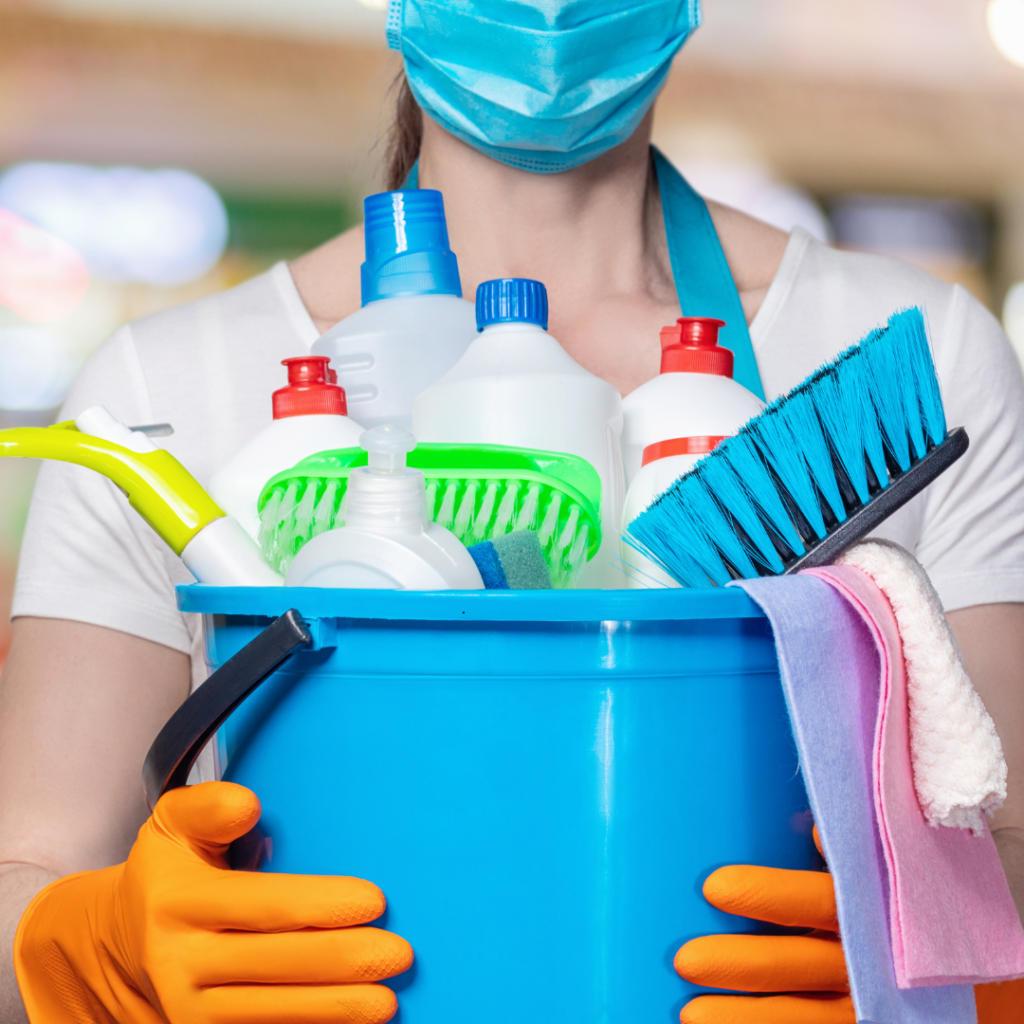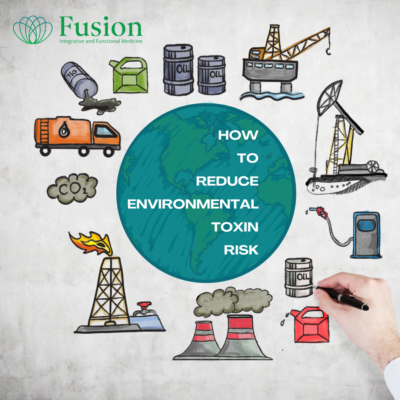Fusion IFM certified Health Coach Cortney Goodstadt provides real-world guidance to minimize daily toxin exposure.

By Cortney Goodstadt, DPT, AFMHC
Take a moment and think about our food supply, the products you use to clean your home, the products and cosmetics you place on your skin, and the general environment and air that you breathe in your home and office.
If you’re like me, you might feel a little disgusted now. Furthermore, you may be struggling with health issues due to toxin exposure and not even realize the symptoms. It is essential to understand the specific toxins we commonly encounter and how to remedy the exposure to live longer, healthier and happier lives.
Humans create many environmental toxins, but others occur naturally in the environment–
Examples:
Man-Made Toxins Naturally Occurring Toxins
Phthalates Mercury
BPA Formaldehyde
Pesticides Cadmium
Lead
Radon
Benzene
Arsenic
These toxins have four distinct entry methods into the body:
- Skin
- Inhalation
- Digestion
- Injection
Once encountered, the body has various ways of handling or metabolizing the objectionable toxin. This reaction often varies, depending on how long you have been exposed to the noxious substance.
Brief or mild environmental toxin exposure

Being exposed to toxins for a short period of time can have somewhat negative, yet in the scheme of life, mild consequences. These may include:
- Abdominal pain
- Cough and sneezing
- Diarrhea
- Excessive fatigue
- Headaches
- Nausea and vomiting
- Skin irritation
- Throat and nose irritation
Long-term toxic environment exposure
Long-term exposure to toxins is incredibly unhealthy. Many short-term effects of exposure begin to take hold and can present as complex and more serious physical conditions. As exposure continues, the damage it causes can result in chronic disease and have permanent physical effects.
Toxins can affect the body by disrupting the endocrine system and can become carcinogenic. Those toxins that disrupt the endocrine system interfere with the body’s ability to produce hormones and participate in cell signaling. This can negatively affect the reproductive, immune, and neurological systems.
Additionally, it may alter a person’s behavior and personality. In children, it can cause issues with development. Possible effects may include (but are not limited to) obesity, aggressive behavior, hormone-dependent cancers such as breast and prostate, infertility, early-onset puberty, low sperm and testosterone, increased risk of diabetes, thyroid dysfunction, lung cancer, Parkinson’s disease and other neurological disorders.
READ: “Five Reasons You Need a Functional Health Coach”
Actionable steps for environmental toxin protection

As a mom and health coach, I am shocked by this information and want to educate others on making simple yet actionable lifestyle changes to affect your health and save our planet. Here are some things that you can do to make a difference.
Here are simple and achievable action items to reduce everyday toxins and protect yourself and your loved ones:
1. Reduce exposure as much as possible to decrease your risk of adverse health effects.
2. Remove toxins from your home and your skin:
- Use green cleaning products (be aware that some products that market themselves as “toxic-free” or “clean” are not! Read the labels.)
- Replace candles and air fresheners with essential oils.
- Add plants to your home to create cleaner air.
- Use natural skincare and makeup.
- Replace non-stick cookware.
- Avoid using the microwave whenever possible.
- Reduce the use of plastics.
- Leave footwear outside or by the entrance to your home.
- Use a dehumidifier to reduce mildew or mold.
- Consider an air purifier.
- Filter and remineralize drinking water.
3. Remove toxins from your diet:
- Reduce refined seed and vegetable oils.
- Eliminate foods stored in plastic as they may disrupt hormone function.
- Eliminate foods with trans fats.
- Eat organic foods whenever possible.
- Avoid buying and consuming sugar-laden foods and beverages.
- Eat certified organic and grass-fed meats and wild-caught fish.
- Eliminate processed foods.
READ: “Harness the Healing Powers of Grounding”
Reducing environmental toxins: Committing to living safer and disease-free

While it is difficult and nearly impossible to live a full, toxic-free lifestyle — as the air we breathe is full of pollutants —choose to make small changes to minimize toxins you can control in daily life.
Unfortunately, in traditional health and wellness, environmental toxins are an overlooked piece of the wellness puzzle, but our Fusion IFM team is dedicated to helping our patients live as toxin-free as possible in today’s world.
Allow me to help lead the way as you build a healthier future for you and your family.
Let’s get started!
_______________________________________________________________________

To learn more about improving and protecting your lifelong health, schedule a Free Discovery Session with Cortney or one of our certified functional medicine health coaches. Learn more about the conditions we treat here: https://fusionifm.com/services/.
This article is for informational purposes only and should not be used in place of an individualized healthcare visit.

